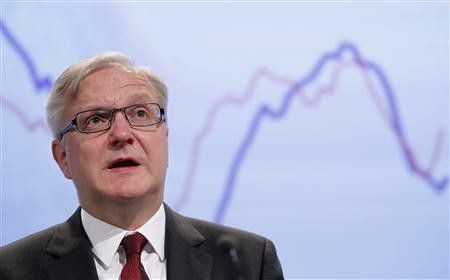European Commission Predicts Recessionary 2012 For Euro Zone

The euro zone area will fall back into recession this year due to the contracting economies of Greece, Italy and Spain, the administrative arm of the European Union said Thursday, abandoning its earlier prediction that recession will be avoided.
The Brussels-based European Commission cut its 2012 outlook for Greece to a contraction of 4.3 percent from a contraction of 2.8 percent. Forecasts for Italy and Spain were also revised down to 1.3 percent and one percent, respectively, after original forecasts calling for slight growth in those two countries.
Those three revisions had a ripple effect on the commission's 2012 outlook: It predicted the 27-country European Union's real gross domestic product will remain unchanged in 2012, down from the commission's earlier forecast of 0.6 percent growth; and the 17-country euro zone, EU countries that use the euro, will contract by 0.3 percent, down from the commission's earlier forecast of 0.8 percent growth.
The commission, which said a tepid recovery stalled at the end of 2011, forecast the first two quarters of 2012 will be negative, the textbook definition of a recession, with the final two quarters of 2012 offering some relief, though that prediction relies heavily upon a turnaround in several struggling sectors.
The commission blamed slumping consumer confidence and ongoing weak global demand weighing down exports. However, it expressed optimism that steps being taken to contain the Greece's sovereign debt crisis and protect it from spreading to Italy and Spain will help stabilize markets.
While the broad financial-market situation in the EU remains fragile, and uncertainty is still weighing strongly on private investment and consumption, the risk of a credit crunch has been reduced, largely due to the liquidity measures taken by the ECB, the commission said in its report.
Although growth has stalled, we are seeing signs of stabilisation in the European economy, said Ollio Rehn, vice president for Economic and Monetary Affairs. Economic sentiment is still at low levels, but stress in financial markets is easing.
The commission pushed back against predictions of a prolonged recession, saying risks of an aggravated sovereign debt crisis leading to a credit crunch remain tilted to the downside. An economic bounce-back in the second half of the year is expected, bolstered by a rebound in confidence and demand.
Many of the steps that were essential to deliver financial stability and to establish the conditions for more sustainable growth and job creation have now been taken, Rehn said. With decisive action, we can turn the corner and move from stabilisation to boosting growth and jobs.
© Copyright IBTimes 2024. All rights reserved.











